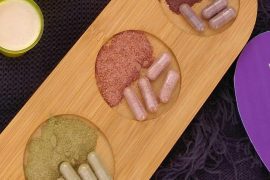Get the basics right
Folic acid
Most people have heard about the importance of folic acid supplementation for at least 3 months pre-pregnancy. Certain drugs can interfere with the absorption or utilization of folic acid including the oral contraceptive. Folic acid is a type of B vitamin and also referred to as B9 or folate. It is an important nutrient for, among other things, rapid cell division and therefore required in larger amounts during pregnancy when our bodies are busy dividing cells like there’s no tomorrow. Neural tube defects are the most frank sign of this deficiency, although it is likely that less severe changes arise in the embryo with milder deficiencies.
Your doctor will prescribe a folic acid from the pharmacy although I have noticed a few doctors recommending the more expensive brand name folic acid/pregnancy multivitamin lately. My advice is to ask for the standard subsidized folic acid because although it looks impressive, the other (popular) folic acid/multivitamin is really just folic acid with a sprinkling of other nutrients and a high price tag. You are better off to take the subsidized folic acid and a decent multivitamin. And remember your food sources too! Green leafy vegetables, legumes, liver and nuts are the best source of folic acid in food.
One last word about folic acid. Some research has suggested that up to 30% of the population may not be able to convert folic acid within the body to its activated form. This would leave a person with a deficiency even if they were taking folic acid. If I suspect this in a client due to recurrent miscarriage or a previous child with birth defects, I will get them on to a special form of folic acid that their body doesn’t have to activate.
Iodine
Iodine is an important mineral for the proper functioning of the thyroid gland, which governs growth and development. From conception through to adulthood it is vital for brain development and cognitive function. This makes it an important preconception consideration.
A study in 2005 found that infants that were breastfed had iodine levels half that of formula fed infants, showing the high rate of deficiency among New Zealand mothers. This is no reason to use formula, but a good reason to consult with someone about taking iodine.
Iodine deficiency became quite widespread in the early 1900s in New Zealand but leveled out with the iodisation of salt. Unfortunately the iodine status of kiwis has been declining again to such a level that intervention is once again required. Iodine was recently added to bread in an attempt to increase the general populations intake. Iodine is naturally found in seafood and shellfish, seaweed, eggs and spinach. Most other fruits, vegetables, meat and grains should contain some level of iodine but it is reflective of the amount of iodine in the soil. New Zealand now has very low levels of iodine in our soil, as does our animal feed (whether grass or chicken feed, etc).
Three other reasons for the mass deficiency include:
- High consumption of commercially prepared foods that usually contain non-iodised salt (it is cheaper).
- The decrease in use of iodised salt for health reasons and also the rise of rock salt, etc.
- The declining use of iodine containing sanitizers (cleaning products) in the dairy industry, leading to a decline of iodine in our dairy products.
Some doctors now make it a standard prescription when you fall pregnant and I often recommend continuing it through breastfeeding. It is important not to self-prescribe iodine in case you really don’t need it. Some people can get palpitations, overactive thyroid and anxiety if they take iodine when they don’t need it.
There are a myriad of other options, some necessary, some not, you will hear about on your journey to becoming pregnant and/or having your child. You and your baby’s requirement will be unique, therefore seek advice from experts. And remember, you want to give your offspring roots in the ground and wings to fly with, not eczema or obesity!
Annaliese Jones – Naturopathy, Nutrition, Herbal Medicine. Annaliese has a Bachelor of Health Science and Advanced double Diplomas in Naturopathy and Herbal Medicine, plus 15 years clinical experience. Annaliese brings both science based medicine and traditional healing wisdom together. The best of both worlds!










